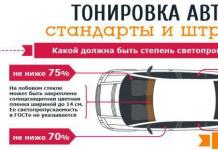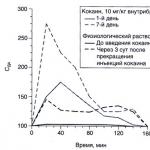Attention! The entry into force of the decision to abolish paper vehicle passports has been postponed from July 1, 2016 to November 1, 2019.
Good afternoon, dear reader.
This article will consider a regulatory legal document - the Decision of the Board of the Eurasian Economic Commission "On approval".
This document is valid from October 28, 2015, i.e. starting from this date, vehicle passports in Russia can be issued electronically.
The following questions will be discussed below:
Let's get started.
Cancellation of paper vehicle passports from November 1, 2019
First of all, let’s consider subparagraph a of paragraph 2 of the Decision of the Board of the Eurasian Economic Commission:
2. Establish that:
a) until November 1, 2019, it is allowed to issue vehicle passports (vehicle chassis passports) in the form and in accordance with the rules established by the legislation of the member state of the Eurasian Economic Union (hereinafter referred to as the member state);
It follows from this paragraph that starting from November 1, 2019, PTS will be issued only in electronic form. Those. All new cars will have an electronic passport; paper documents will not be issued.
Replacing a paper PTS with an electronic one
The replacement of paper PTS with electronic ones is regulated by subparagraph d:
d) replacement of vehicle passports and passports of self-propelled vehicles and other types of equipment issued before the entry into force of this Decision, as well as in accordance with subparagraphs “a” - “c” of this paragraph with electronic passports of vehicles and electronic passports of self-propelled vehicles and other types of equipment carried out at the request of the owner of the vehicle(self-propelled vehicles and other types of equipment);
If desired, any car owner can change the vehicle's paper passport to an electronic one.
At the same time, many drivers are concerned about the following question. Is it necessary to change a paper PTS to an electronic one? Regulatory documents do not require mandatory receipt of electronic PTS. Therefore, the paper version can be used until it runs out of space for new owners.
Simultaneous use of electronic and paper PTS
Please note that a vehicle cannot have both a paper and electronic PTS:
e) simultaneous issuance of an electronic passport and a paper passport for 1 vehicle (vehicle chassis), self-propelled vehicle and other type of equipment is not allowed.
What is an electronic PTS?
An electronic PTS is a record in a database that contains information about the car, as well as its owners. A complete list of information contained in the ePTS is given in the Procedure for the functioning of systems of electronic passports of vehicles (electronic passports of transport chassis) and electronic passports of self-propelled vehicles and other types of equipment.
If you wish, you can study the list of information that should be contained in the electronic PTS. For comparison, I suggest you pick up a regular PTS. You will notice that a paper passport contains much less data.
Moreover, after issuing an electronic PTS, the owner of the car receives an extract that he can print. This extract will be analogous to a paper PTS. In this case, the extract contains only part of the information from the electronic PTS. The contents of the extract are given in.
So the introduction of electronic PTS will help solve the problem of determining the category of a vehicle in controversial cases. The fact is that some foreign cars can be classified in Russia as both buses and trucks. However, in practice, government officials usually classify a car into the group where payments to the budget (customs, taxes, etc.) are higher. The introduction of a new form of PTS will make it possible to unambiguously classify a vehicle into one category or another.
Who can receive information from the electronic PTS
Clause 12 of the Operating Procedure for electronic PTS systems contains information about who can receive information from an electronic passport free of charge. Let's consider subparagraphs d and d related to ordinary drivers:
12. Participants in electronic passport systems for use exclusively for their own needs and (or) to implement the tasks assigned to them in accordance with this Procedure and (or) the legislation of the Member State are provided with the following information upon request without charge:
...
d) to the owner of the vehicle (chassis, car) - information in the amount provided for in Appendices No. 1 and 2 to this Procedure;e) to other persons - information about the status of the electronic passport upon request containing:
identification number (VIN) of the vehicle (chassis), chassis number (frame) or body number (cabin, trailer) - for the vehicle (chassis);
vehicle identification number or body number (cabin, trailer) - for the vehicle.
Let's consider this point from the point of view.
A potential buyer can only obtain information about the status of the electronic vehicle title using the VIN number of the vehicle. Those. the buyer can find out that the PTS is in one of the following statuses:
- unfinished;
- active;
- canceled;
- canceled;
- recycled.
When purchasing a car with an electronic PTS, I recommend that the buyer check the status of the document. The correct meaning in this case is “active”. If the title is in a different status, it is better to refrain from buying a car.
Apart from the status, the buyer cannot receive any additional information from the electronic PTS. Those. in fact, the buyer has no confirmation of who actually owns the vehicle.
However, the seller can confirm that he is the owner of the vehicle. To do this, he must make a request to receive an extract from the electronic PTS. This information is issued only to the owner of the vehicle. Therefore, its presence can serve as a guarantee that the car is being sold by its current owner.
In addition, the buyer can access information for a fee:
13. Participants of electronic passport systems on a contractual basis access to the information contained in electronic passports and to the services of electronic passport systems is provided to the extent, in the manner and under the conditions determined by the administrator, except for the cases provided for in paragraph 12 of this Procedure.
In this case, the list of information that can be obtained on a contractual basis is determined by the system administrator.
Advantages of electronic PTS
An important advantage of the electronic PTS is the practically unlimited amount of information that can be contained in the document. The electronic PTS cannot run out of space for recording owners, so you will never have to.
In addition, PTS in electronic form can be stored indefinitely and cannot deteriorate over time or from external influences.
Questions raised by the introduction of electronic PTS
However, the introduction of electronic PTS raises some questions:
1. Difficulty in completing purchase and sale transactions. It is not clear how the seller can enter a new buyer into the ePTS, since he does not have access to the database. All that remains is to issue it.
2. Buying cars on credit. Previously, the PTS remained pledged to the bank until the loan was repaid. It is impossible to pick up an electronic PTS, because it is stored in a government database.
To summarize this article, I would like to note that electronic PTS will ultimately make the life of car owners more convenient. However, in the first few years, many drivers will encounter various technical difficulties, so I do not recommend rushing to replace the paper PTS with an electronic one.
Good luck on the roads!
From July 1, 2017, our country must completely switch to electronic vehicle passports (PTS). More precisely, they will be issued throughout the EAEU - that is, in Russia, Belarus, Kazakhstan, Armenia and Kyrgyzstan (Decision of the Board of the Eurasian Economic Commission dated September 22, 2015 No. 122 ""). The EAEU agreement on electronic PTS was adopted in August 2014, and Russia ratified it in June 2016 ().
It is expected that by July next year, owners of cars and other vehicles will be able to obtain an electronic title voluntarily. At the same time, it is impossible to receive a PTS in both paper and electronic form at the same time. True, there is no such possibility yet - the mechanism for issuing and using electronic PTS is still being developed. Responsible for its creation is Electronic Passport OJSC, which is part of the Rostec state corporation.
Electronic PTS: how it will work
Both the car factories themselves and JSC Electronic Passport will be able to issue new PTS. The first ones will issue electronic passports for cars that came off the assembly line of a particular automaker (today this rule also applies to paper PTS). The second will issue PTS for cars that have already been put into circulation, imported into the territory of the Customs Union, etc. (; hereinafter referred to as the Procedure). In any case, the owner of the car will receive an extract from the title in electronic form and, if necessary, will be able to print it ().
By the way, only tax and law enforcement agencies will have access to the full version of the electronic PTS (). The content of the extract will be very truncated. It includes the following information:
- vehicle or chassis identification number (VIN);
- name (including commercial), category and make of the vehicle;
- engine, chassis and body numbers;
- vehicle color;
- year of manufacture;
- engine data (make, type, volume and power);
- environmental class;
- maximum vehicle weight;
- territory in which a vehicle can be registered ().
As you can see, from the extract it will not be possible to find out even the month of manufacture of the car (unlike the electronic passport itself) - and this may matter when selling it: often cars produced in January and December of the same year have different market prices. Today this can be approximately determined by the date of registration of the PTS, which is indicated in the paper passport - but it is not provided for in the extract from the electronic one. The same applies to the country of origin of the car, information about which is also not included in the extract (as a rule, cars with foreign assembly are more expensive).
The full version of the electronic PTS contains, in addition to the specified information, detailed information about the car with a description of all its systems: engine system, fuel system, steering system, brake system, etc. You will even be able to find out what additional equipment the car has. Finally, the electronic PTS also includes some administrative information: the PTS number itself and the date of its registration, the country of export of the car, information about payment of the recycling fee, customs restrictions, the status of the PTS (is it valid or, for example, cancelled), etc. ().
Let us note separately that information about the owner of the vehicle will not be included either in the full version of the title or in the truncated version. Whereas paper passports allow you to find out both the current owner and the previous ones.
The scheme for using electronic PTS is as follows. When purchasing a new car, an electronic title, as today, will be issued to the buyer by the car dealership. When the owner of the car registers it, the traffic police will have to inform Electronic Passport OJSC about this. And she will enter registration information into the electronic PTS. The same applies to changes in the design or color of the car, which are also subject to registration ().
It was originally planned that the state duty for issuing an electronic PTS would be 800 rubles, and for making changes to it – 350 rubles. But so far, changes to the Tax Code of the Russian Federation have not been developed, and it is impossible to predict the final amount of the duty for these services. Let us remind you that today it is the same as the one indicated (,).
It is important that all information ever entered into the electronic PTS will be stored indefinitely. This also applies to passports with the statuses “recycled” (if the vehicle was scrapped), “cancelled” (in relation to a car on the basis of which another car was created) and “cancelled”. An electronic PTS can be canceled for several reasons. For example, when a car design safety certificate, the presence of which will become mandatory when issuing electronic vehicle registration certificates for new cars, was declared invalid. Or when the automaker declares that the electronic title of a particular vehicle contains false information about the year of manufacture or VIN ().
How will the introduction of electronic PTS turn out in practice?
On the one hand, the advantages of the new type of passport are obvious. OJSC "Electronic Passport" itself notes that car owners will not need to store the PTS (and therefore, it will not be possible to lose it). In addition, with the automation of the process of issuing electronic PTS, the influence of the human factor should be reduced, followed by the risk of errors. Another advantage is the expected reduction in time for state registration of a car due to the fact that inspectors will have access to a database of electronic vehicle registration certificates. In addition, information about registering a car (as well as about changing its design or color) will be added to this database immediately, which will allow government agencies to work more quickly.
Finally, the introduction of electronic PTS will reduce budget expenses - both due to savings on passport forms, and due to the fact that there will be no need to administer the issuance of these forms to manufacturing plants. According to OJSC "Electronic Passport" for 2015, about 4.5-5 million forms are issued in Russia per year, each of which costs about 103 rubles. Thus, the total annual savings will be approximately 464-515 million rubles. However, it is not yet known how much it will cost to create an electronic passport system and maintain it in working order.
But at the same time, a number of questions arise regarding the use of electronic PTS. For example, when buying a car, how can you determine that the bearer of the extract from the electronic PTS and the owner of the car are the same person? After all, the owner of the car is not indicated in the statement itself. And although only the owner of the car can receive it, theoretically this document could end up in the hands of criminals. The State Traffic Inspectorate, in response to a request from the GARANT.RU portal, advised when purchasing a car to study the registration certificate of the vehicle, in which the owner is already registered.
Another question is that the extract from the electronic PTS will not indicate who owned it before (while today this is noted on the paper PTS in special columns). Thus, it will no longer be possible to find out the history of a car by simply studying its documents. But, according to the head of the Federation of Car Owners of Russia Sergei Kanaev, this is compensated by the creation of a special service, which the State Traffic Inspectorate is currently working on. It will be posted on the official website of the department (gibdd.ru) and will allow you to check how many owners the car had. “And the absence in the extract from the PTS of an indication of who is the owner of the car is normal international practice,” the specialist shared.
There is also a risk that attackers will hack the electronic PTS database and this information will end up in the hands of fraudsters. The State Traffic Inspectorate assured that services containing information about cars and their owners are reliably protected from third-party interference and ensure the protection of citizens’ personal data. Experts are also confident that there is no more cause for concern than there is today. For example, Sergey Kanaev believes that data leakage can also be counteracted by Electronic Passport OJSC as the operator of the electronic PTS database, which knows exactly who was granted access to specific information.
Finally, it is not yet clear how the new form of PTS will affect the cost of loans to purchase a car. The fact is that nowadays banks quite often, when issuing a car loan secured by a car, require you to hand over the title to them in order to protect themselves from the unauthorized sale of the pledged car. And a loan to buy a car without transferring the title usually costs more. It is basically impossible to transfer an electronic PTS. But even here, experts look at the situation quite optimistically.
OPINION
 |
Sergey Kanaev, head of the Russian Federation of Car Owners:
“The introduction of electronic PTS will only have a positive impact on the car lending market. I think that the next changes, which we are only guessing about, but don’t know yet, will affect banks. Obviously, a record will be made in the electronic PTS database that the car was purchased on credit and is the subject of collateral. And until the bank gives its permission to sell the car, no one will be able to buy it. Moreover, this will provide certain guarantees to buyers, having bought a car today, after some time they discover that it is not available. is pledged to the bank."
There is still more than a year until the complete transition to electronic PTS and, obviously, many details of their design and use will still be prescribed in by-laws. But experts are already assessing the innovation positively and emphasize that with the introduction of PTS, many fraudulent schemes will become a thing of the past - for example, the sale of counterfeit PTS, including via the Internet.
From July 1, 2019, paper PTS will no longer be issued in the territory of the Eurasian Economic Union (Russia, Kazakhstan, Armenia, the Republic of Belarus, Kyrgyzstan) - they will be replaced by electronic versions of the document.
Initially, the date for the introduction of electronic passports was planned for July 1, 2017 (according to Decision No. 122 of the Eurasian Board of September 22, 2015 “On approval of the Procedure for the functioning of electronic passport systems”), but for a number of objective reasons the final date was postponed by a year.
What is an electronic PTS? What are the goals of introducing electronic documents? Is it necessary to change existing PTS to a new type of passport (when selling a car, registering, etc.)?
Electronic vehicle passport
The vehicle passport contains basic technical information about the vehicle (motorcycle, truck, self-propelled vehicle, etc.), as well as information about the owner. This document must be presented to the traffic police along with your driver’s license and insurance. Until recently, paper PTS were issued - unified forms with holographic stamps. The paper PTS indicated:
- car make and model,
- engine characteristics,
- year of manufacture of the car,
- place of registration of the vehicle,
- list of owners.
It was decided to replace the paper PTS with an electronic passport.
There are several reasons.
Electronic document management should remove from circulation papers that tend to wear out, contain a limited amount of information, and which theoretically can be lost.
An electronic vehicle passport, a set of digital data in the form of a record in a database, is completely free from these shortcomings. Electronic form of data storage facilitates:
- processing by specialists of registration, accounting, tax and other authorities,
- speed of checking documents of the traffic police.
Electronic PTS will not have to be changed, including due to the next change of vehicle owner.
The main advantage of the electronic PTS is the ability to create a unified electronic database of all vehicles operated in the territory of the Union. This will make it easier:
- accounting,
- work to identify illegal transactions,
- will simplify the calculations of tax and customs payments,
- will allow you to quickly access the car’s history and much more.
Electronic PTS: how to apply
Electronic passports are already being issued along with paper PTS. From July 1, 2019, everyone who purchases a new car or goes through the registration procedure will receive a new type of documents. The issuance of an electronic vehicle passport automatically invalidates the paper PTS. There is no forced replacement of a paper PTS with an electronic one. Old type passports can be used until they run out of space to indicate information about the new owner of the car.

Any car owner has the right to change the old title. To do this, you need to apply to the nearest traffic police department. In fact, an electronic passport is an entry in a database. The car owner receives only an extract from the electronic vehicle title with a limited amount of data. Only the current owner of the vehicle can receive such a statement.
Electronic PTS status
The owner of an electronic passport can contact the traffic police at any time and receive complete information about his car. A citizen who plans to purchase a car will not be able to obtain data. The status of an electronic passport (like a VIN number) is the only way to find out anything about the vehicle. When requesting information about the status of the electronic PTS, you can receive the following response:
- valid (an electronic valid title has been issued for this vehicle);
- incomplete (at the moment a passport for the car is being issued, and the relevant data is entered into the electronic system);
- canceled (the vehicle has not been cleared through customs or is located outside the country);
- canceled (electronic PTS is invalid; the most common reason is that the car was re-equipped and acquired the characteristics of a vehicle of a different category);
- scrapped (the car was deregistered for the purpose of recycling).
Information about the status of the electronic PTS will help you make a decision about purchasing a car. The current PTS status means the legality and legal purity of the executed car purchase and sale transaction.

Extract from the database
According to the provisions of paragraph 12 of the Procedure for the functioning of electronic PTS systems, access to the database will be available to an extremely limited circle of persons. First of all, it is the owner of the car who can receive an extract. Having an extract in hand means that the citizen is the owner of the car (when buying a car, always ask to see the extract!). Complete information about the vehicle can be obtained by employees of the traffic police, tax, customs, registration and accounting authorities, the Ministry of Internal Affairs, the FSB, the Federal Security Service, etc.
Extracts from the electronic PTS contain the following list of data (according to Appendix No. 1 to the Procedure for the Operation of Electronic Passport Systems):
- VIN number of the vehicle;
- name of the make, model, category of the vehicle;
- engine and chassis (body) number;
- body color;
- year of manufacture of the car;
- brand, type, volume and power of the engine;
- environmental class of the power plant;
- maximum permissible vehicle weight;
- registration area.
The statement lacks important information that is indicated in paper PTS. It will not be possible to find out the month the car was produced (a serious drawback: cars produced in January and December of the same year may have a significant difference in cost). There is no information about the country of manufacture of the car: the owner of a foreign-assembled car demands a higher price for the vehicle being sold. Information about the former owners of the car - only the owner of the car can find out about their number and only upon request.
First results of the new electronic PTS system
Electronic vehicle registration certificates have been issued on the territory of the Customs Union for the second year. Both car owners and specialists have already been able to evaluate their effectiveness. The goals of the initiators of the new system have been practically achieved: it is easier and faster to work with electronic PTS, because they ensure the efficient work of government bodies, and computerized processing of digital data minimizes errors and allows for the prompt execution of certain papers. Electronic PTS cannot be lost, dirty or counterfeited. An extract from the PTS is available at any traffic police department.

Does the new system have any disadvantages? The use of electronic PTS has exposed a number of problems.
A serious issue is the identification of the owner of the car. Having an extract in the hands of a citizen does not guarantee that you are the actual owner of the vehicle. There is no information about previous owners: it can only be obtained after purchasing the car.
Buyers of cars on credit may encounter certain difficulties. Today, banks continue to require the original PTS, and in its absence, they significantly increase the interest rate on the loan issued.
Additional materials on the topic:
How to properly register a car with the traffic police in 2019?
 Application for registering a car with the State Traffic Safety Inspectorate: download the vehicle registration form and sample form for 2019
Changes in compulsory motor liability insurance from March 1, 2017
Application for registering a car with the State Traffic Safety Inspectorate: download the vehicle registration form and sample form for 2019
Changes in compulsory motor liability insurance from March 1, 2017
Discussions about issuing electronic passports for vehicles have been going on for quite some time. A complete replacement of the paper version was supposed to be introduced back in July 2017. But, due to the circumstances that arose, it was decided to postpone this procedure for one year.
That is, already in 2018, the electronic PTS will completely replace its paper counterpart. What nuances does this procedure contain?
All motorists know perfectly well why a passport for a technical device is needed. Such a document contains all the technical information about the vehicle, along with information about the owner. And this paper is always required to be presented by traffic police officers during registration procedures. Along with it, you must also present a driver's license and insurance policy.
Paper versions have their own peculiarity, which is presented in the form of holographic seals.
The document contains the following information:
- Vehicle model and make;
- Motor power indicators;
- When was the car released?
- Where is the car registered?
- Who is the owner of the vehicle (list, if there are several).
But, at the legislative level, a decision was made to replace the paper document with an electronic PTS. Why is an electronic vehicle title better than a similar information carrier on paper?
What is an electronic passport?
Paper is a material that wears out quickly. In this regard, its replacement with a more practical option is considered completely justified. In addition, any document that a person carries with him is quite easy to lose.

Electronic PTS excludes this possibility. In addition, such a medium may contain more information than regular paper. It is much easier for the traffic police to check documentation if information is available in digital format. And also process all data about the motorist in the registration and accounting authorities.
The new form of the document, which was planned for implementation in 2018, will not need to be replaced by a new document. Even in the case when the owner of the car is replaced.
The main advantages of owning an electronic version of a car passport:
- one database will be created in which all vehicles in the country are recorded, this will greatly facilitate the work of the traffic police;
- It will become easier to identify any illegal transactions related to cars;
- Calculating payments for taxes and customs duties will also become much easier;
- in the shortest possible time you will be able to familiarize yourself with the history of the vehicle.

Registration of PTS in electronic version
Since 2017, passports can be obtained in electronic format, just like their paper counterpart. But starting in July next year, when purchasing a vehicle, owners will be issued documents of a new format.
If the car owner has a paper document, then issuing a new one automatically invalidates it.
But it is worth understanding that the legislator does not oblige to forcibly undergo the procedure for replacing a document. The old passport, which has a paper version, will also be allowed to be used. But when there is no longer room in the document to include new owners of the car, it will still have to be replaced.
But every car owner has the right to receive a new document at his own request.
How to apply and where to go with this question, everything is quite simple here. Such documents are drawn up at the traffic police department at the place of registration of the motorist.
For many, the question remains open of what a new document looks like if it is presented only in a digital version. In fact, this is true, this is only complete information about the vehicle and its owner, which is contained in a single database. But the owner of the car will also receive some paper, which is an extract from a digital document. It will contain only minimal data.
Contents of the document extract
Not everyone will be able to have access to a single database that will contain all the information about the vehicle. First of all, such an extract will be provided to the owner of the car. In addition, information may be requested by accounting and control authorities. In this case, they will also be provided with complete information.

What should appear in the extract from the electronic document:
- category, make and model of the car;
- body and engine numbers, as well as VIN number;
- the color of the car and the year of its production;
- engine information;
- permitted vehicle weight;
- Where is the vehicle registered geographically?
But in such a document, in comparison with the paper version, there is no information specifically about the month in which the car was produced. And this can play a significant role in determining the cost of the vehicle. The country of manufacture is also not indicated. Which is also very important when buying a car.
And, probably, the most important drawback is the lack of information about the previous owners and their number. Only the owner of the car receives such information, and only upon appropriate request.
The Government of the Russian Federation adopted a resolution on the introduction of electronic vehicle passports (PTS), the transition to which was constantly postponed previously. The new effective date for the electronic standard is July 1, 2018. The Ministry of Industry and Trade stated that the implementation of electronic vehicle passports will be carried out by the state corporation Rostec.
According to the plan, the innovation will help avoid delays associated with restoring a document in case of its loss, and will also protect citizens from shady schemes when buying or selling a car. Employees of the State Traffic Inspectorate, authorized participants in electronic passport systems and, of course, vehicle owners will have access to the electronic PTS. The large-scale project will make the registration and accounting of a car 100% digital, and its history completely transparent, because all information about the car will be stored in a secure database.
The electronic passport of the car will contain additional information about the owner, its provision is regulated by the Federal Law of July 27, 2006 No. 152-FZ “On Personal Data”. In addition, the PTS will include data on the vehicle’s technical inspection, maintenance and repair, its mileage and possible restrictions on registration actions. Also, the online passport will contain data on insurance cases and the car insurance itself, accidents in which it was involved, and other information that the owner or authorized body will indicate.
For automakers, the authorities plan to ensure a smooth transition to electronic PTS: its start will depend on the readiness of the companies themselves, but no later than July 1, 2018. It is expected that already in the first half of the year, electronic PTS will be issued to more than half a million vehicles. Old paper passports will not be issued after this date.
As for current car owners, they will be able to continue to use the current document: there are no plans to forcefully replace the PTS with an electronic version. The introduction of the new standard will not affect the process of buying or selling a car in any way: as now, you will have to draw up a sales contract and obtain a vehicle registration certificate.
Despite the fact that the PTS goes online, you will still have to pay for it: 250 rubles for automakers and organizations authorized to issue them, and no more than 600 for ordinary citizens. Currently, obtaining a new paper PTS for vehicle owners costs 800 rubles.
According to the department, savings on the purchase of paper forms and costs associated with their logistics will amount to about 1 billion rubles. If we talk about reducing labor costs for registration of PTS and making changes to them, then they are expected to be reduced by 3.5 million man-hours per year.

















